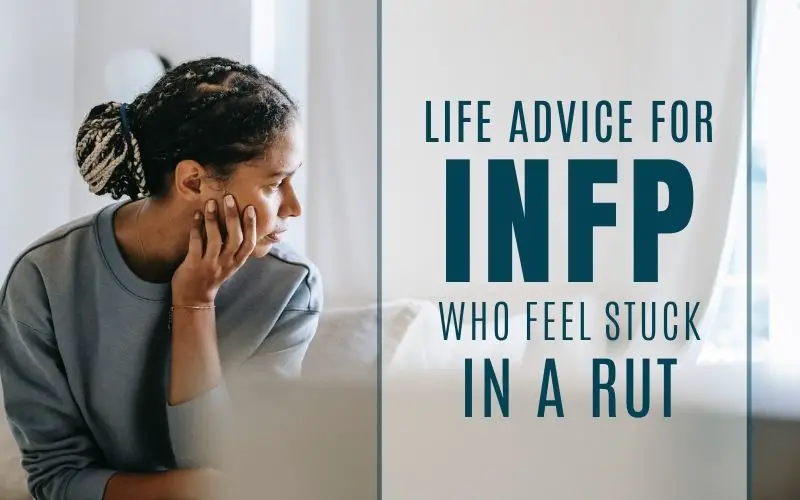Being an INFP in a sensing and extroverted world is bittersweet. Have you ever asked yourself why you’re so different? As you watch people progress in life, you start to assess yourself and question your purpose. The once “gifted child” loses their magic, it gets harder to fit in, and the world shuns away your creativity.
Dejection, gloom, and indifference. All are crippling slowly.
Admittingly, you’re not alone. I felt these rollercoasters of emotions, too. Nothing’s worse than feeling exhausted despite being at home or having social withdrawals after a supposed “fun” day. Unexplainably, there’s just this… void.
But on the bright side, bear in mind that these feelings are all temporary. While INFPs feel lost sometimes, we’re also undoubtedly hopeful, forward-looking, and idea generators. INFPs shift from emptiness to gratitude to childlike happiness. It’s truly one heck of a rollercoaster.
5 Life Advice for INFPs Who Feel Stuck in A Rut
If you’re an INFP who’s currently in a rut, I understand what you feel. It’s difficult to tread across powerful surges of emotions. But what can we do? We’re Introverted Feelers.
But let’s look back and appreciate ourselves more. The INFP personality may have struggles, but I can’t discount how our rich inner life is so alluring that I won’t trade my personality for any other type.
That said, let’s fully embrace who we are and improve the innate strengths we have. I’d like to share with you 5 INFP Advice that helped me get through my struggles as an INFP.
1. Don’t fear revealing your true emotions to real friends.
Real friends are there to help.
Let’s admit it. Some immature INFPs loathe being looked down on. They hide their miseries and disappointments to keep their vulnerability out of sight. There are hurts they will never show to the world and keep to themselves for who knows how long. Weeks, months, or years?
I remember carrying the same emotional burden for years and it was a lonely and excruciating fight.
Truly, as a young INFP, faking a smile was my sign of strength back then. I romanticized keeping problems a secret.
And it’s not just me. Many INFPs can outrightly lie about their emotions since no one can verify their feelings aside from themselves.
But after years, I came to realize that caging my emotions wasn’t bravery at all. Instead, hiding my issues only prolonged the sorrow, emptiness, and grief. It’s such a long, tedious route to self-healing.
Sharing your problems with people you trust isn’t a sign of weakness.
Rather, it’s a way to release negative emotions and will help INFPs recover faster. I know you dislike taking people’s unsolicited advice. But it pays to release the building-up frustrations.

Remember, sadness is a valid emotion. If you have watched the Pixar movie, “Inside out” (which you should watch if you haven’t yet), Joy did her best to stop Sadness from “ruining everything”. Only to realize that sadness, cries, and disappointments were all necessary for a person to be heard.
If you don’t show your vulnerability, people will never check if you’re okay and it leaves you wondering why no one cares.
The ability to show your sorrow and dismay gestures a comforting response. If you want to be understood, don’t be afraid to show what you truly feel.
After opening up my real emotions to my family and friends, here’s what I learned:
- Many of your family and friends will come to your rescue. They make themselves available and it’s a heartwarming experience.
- If you wanted to cry out of genuine happiness, or extreme disappointment, show it. It’s liberating to be true to yourself.
- Lastly, my initiative to open up my feelings allowed my friends to relieve theirs, too. We became closer as we tried to lift each other through the struggles and overwhelm.
I think this is one of the best advice for INFP. I know it’s hard for an INFP to ask for help, but this time, you need to validate your emotions and let people hear them.
2. Choose what you’re overthinking about. Some thoughts are not worth your time.
I like it when I overthink about the bursting possibilities. However, when overthinking involves dilemma, what-ifs, and regrets, it becomes a long, horrifying night.
In the end, we’re left with anxiety and unwanted emotions.

According to a study, people have an average of 6,200 thoughts a day. Considering that every single action we do requires decisions – from the moment we wake up to the time we go back to our beds – 6,200 thoughts isn’t that much, is it? (But I guess INFPs can even go overboard.)
That said, spare your thoughts to what truly matters in life.
There are scenarios we must be careful not to delve into too much.
Here are the following:
-
“What-ifs” and “could have beens”
Possibilities and what-ifs fill an INFP’s mind. There are awesome what-ifs like envisioning dreamlands and creativity.
But to “what-ifs” and “could have beens” sprouting from regrets and worries?
These are nothing but downers.
It corrupts your present. If you’re not gonna step forward to make them realistic, it’s time to scrap them off of your 6,200 thoughts.
-
Things that are yet to unfold.
If you can’t do something about it today, then prepare a patient heart because some situations require a waiting time.
“There’s a time for everything and a season for every activity” and most problems of the world can’t be solved in a day. So don’t rush it.
I, too, feel agitation and impatience. But when the realization hits that I can’t do anything at the moment, I’ll just breathe deep and start focusing on something else.
Whenever you catch yourself overthinking, consciously ask yourself, “what can I do now?” If there’s nothing you can do about it today, start to realign your thoughts and accept them for what it is.
Don’t worry. Great things will unfold maybe at a different season, in a different place, or with a different person.
Related Post: How Can INFP Stop Overthinking?
3. Focus on regular output rather than obsessing over the final outcome.
INFPs love seeing the end goal. But truth be told, INFP’s perfectionism paralyzes them once their ideals don’t go as planned.
Some INFPs would start new projects, find fault, leave, and start again. Once they start a new project, they would again find fault, and leave again. The cycle goes on and on and eventually leaves an INFP with zero accomplishment. (Guilty here.)
Moreover, clamping with instant gratification spoils INFP’s motivation. These Dreamers yearn for an immediate return. ALWAYS. Or else they’d think they’re failing, even when they’re not.
To struggling INFPs, please keep this in mind: you’re creative enough. You’re passionate, talented, and ambitious enough.
However, it’s not about how grandiose your dreams are or how skilled you are. It’s about how many times you show up and take baby steps towards your goal.
It’s the many times you punch the clock even when you reached the plateau of boredom.
That said, don’t get obsessed with the “successful” image inside your head. Instead, focus on a regular output. One task at a time and you’ll get there.

Related Post: 5 Steps on How INFP Can Reach Long-term Goals
4. Give time for your passion, creativity, and strengths.
Albert Einstein said, “Everybody is a genius. But if you judge a fish by its ability to climb a tree, it will live its whole life believing that it is stupid.”
Unfortunately, many INFPs overlook their strengths and cut off parts of themselves to fit in and survive in society. Worse, they land on jobs that cage their real strengths and utilize their weaknesses instead. Sadly, this makes INFP’s whole experience in limbo.
But here’s my two cents. I’m not a fan of “working out our weaknesses.” Why try to overcome your weaknesses when you can grow and excel with your strengths? We’ve become obsessed with patching up our losing side that we unconsciously throw away what we’re good at.
That said, here’s some important advice for INFP: don’t neglect your creative side. No matter what age. Let it flourish and grow.
Don’t suppress your interests and be unapologetic about feeding your creativity.
5. Gather information and experiences.
Some people would advise INFPs to “visualize what it feels like” when setting goals. Yeah – creating an image where we become successful, popular, and leave an impact. Partly, it’s helpful (and an awesome theme for afternoon daydreams!) We’re visionaries, anyway.
But to truly achieve the visualized goal, research and experience will introduce firmer decisions to an INFP.
The Power of Research for INFPs
Truth is, with INFP’s Extraverted Thinking (Te) function, these idealists often imitate new information. They re-do the advice or procedure from a book, speakers, or mentors and see for themselves how effective it is for them.
If an INFP reads, “invest in stock market” and they resonate with it, they are likely to dig deep into the subject and emulate the advice. This is also why INFPs love self-help books. They love to learn new knowledge and apply it in their life.
Eventually, INFPs filter out gathered information through their critical self-reflection and come up with original philosophies or more creative output.
With proper research, INFPs also become more patient as they follow procedures and embrace realistic outcomes.
INFPs and Experiences
INFPs learn more from experience and application, and not by sole imagination. Truth be told, imagination messes with our decisions big time.
Why? It’s because INFPs light up with the sound of every new idea which leaves them undecided about which ones to pursue.
But once INFPs acquire experience, they let out a more definitive judgment of whether they like the situation or not.
INFPs must discover and experience more to avoid making superficial decisions based on what they imagined which results in rabid confusion.
Conclusion
It’s hard being an INFP, especially when you’re in a crowd who don’t understand your motivation. Sometimes, the people around us carry a different perception which makes INFP decisions appear strange, irrational, and far out. However, being different is not an excuse to drop your real character.
How to be the best INFP? Understand your core and be you.
INFP is a beautiful personality who serves a distinct purpose.
You strive for authenticity. You’re purposeful and creative. Without people like us, I’ve always imagined how compassion may have been long dead.
While there are several areas an INFP may feel lost in, you can start with the INFP personality advice above and see for yourself how much you grow.
Thanks for reading!
-M.Mathias
Are you an INFP dealing with procrastination? Grab your copy of the “Not Lazy, Just INFP” e-book. 🙂
You may also like:
- 6 Differences Between Healthy and Unhealthy INFP Behavior
-
How Does the INFP Mind Work? 4 Cognitive Functions Explained


thanks for this article. Really helpful